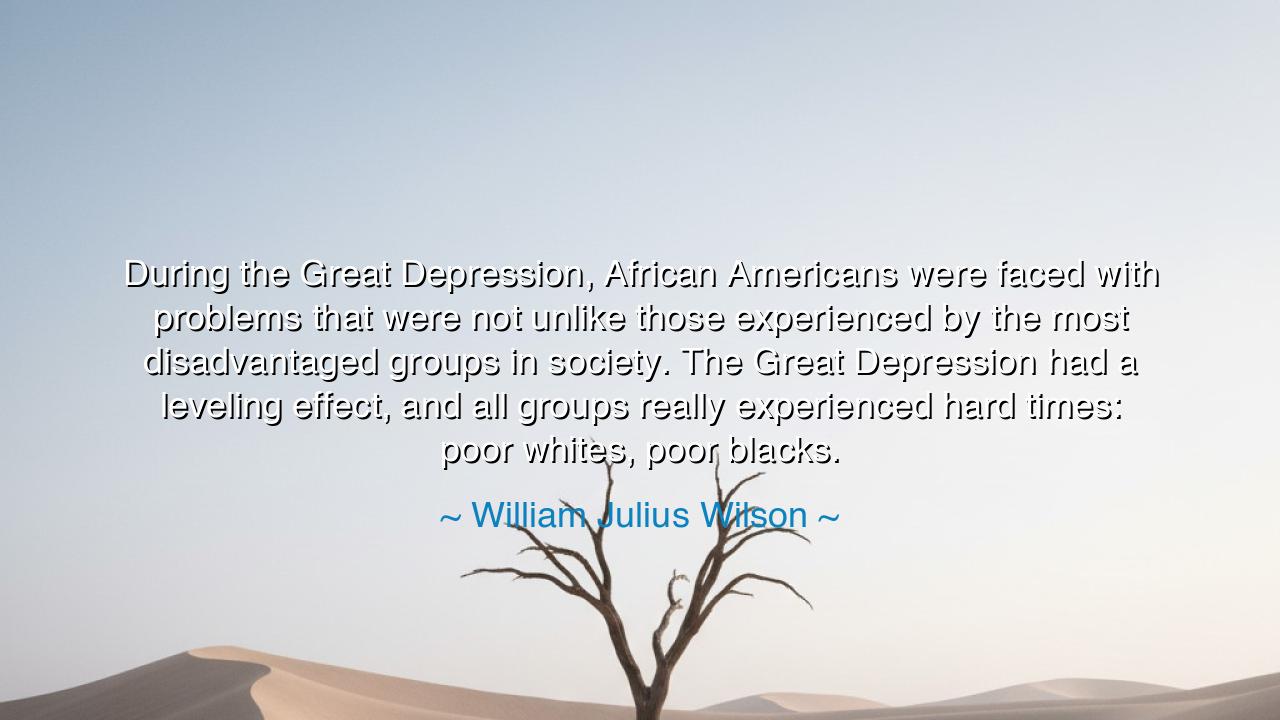
During the Great Depression, African Americans were faced with
During the Great Depression, African Americans were faced with problems that were not unlike those experienced by the most disadvantaged groups in society. The Great Depression had a leveling effect, and all groups really experienced hard times: poor whites, poor blacks.






When William Julius Wilson wrote, “During the Great Depression, African Americans were faced with problems that were not unlike those experienced by the most disadvantaged groups in society. The Great Depression had a leveling effect, and all groups really experienced hard times: poor whites, poor blacks,” he spoke not merely as a historian, but as a seer of social truth. In these words, he unravels a paradox of human suffering: that in times of shared hardship, the illusions of difference fade, and all stand revealed as equals beneath the same shadow of struggle. His words echo through the corridors of history as both lament and revelation — a reminder that pain, though cruel, can be the great equalizer of humankind.
In the early decades of the twentieth century, the United States was a land divided by race, class, and privilege. The rich built their towers of comfort, while the poor — both black and white — toiled in the dust. Yet when the Great Depression struck in 1929, it shattered the boundaries that pride and prejudice had drawn. Factories fell silent, crops rotted in the fields, and the proud found themselves standing beside the desperate in the breadline. For the first time in generations, the walls between men seemed to tremble. The suffering that descended upon the land leveled all, for hunger does not ask the color of one’s skin before it bites.
Yet even in this leveling, inequality revealed its deeper roots. The African American, long oppressed and excluded from opportunity, felt the weight of the Depression with doubled force. Jobs vanished first from the black worker’s hands; aid was slower to reach black families; dignity was harder to keep when discrimination remained, even in despair. And yet, Wilson reminds us that in the face of shared ruin, poor blacks and poor whites were bound together by a common wound — the wound of poverty. In their suffering, they stood as brothers in misfortune, even if the world refused to see them as such.
Consider the story of Langston Hughes, the poet of the Harlem Renaissance, who lived through those years of want. He wrote of the black worker, cast aside but unbroken, who still sang songs of hope amid hunger. In his poem “Let America Be America Again,” he cried not only for his own people but for “the poor white, fooled and pushed apart.” Hughes saw what Wilson would later teach: that class and color had been used to divide those who shared the same pain — that the tragedy of the Great Depression was not only economic but moral. It revealed the common humanity that suffering exposes, yet society, blinded by prejudice, failed to embrace it.
The origin of Wilson’s insight lies in his lifelong study of poverty and race in America. He understood that social divisions often obscure deeper truths — that the same chains bind the poor of every color, and that injustice, left unchallenged, consumes all. His reflection on the Depression is not nostalgia but warning: that only when we see our shared vulnerability can we build a society of shared strength. Hardship, for all its cruelty, strips away illusion and forces men to confront what they truly are — interdependent, fragile, and capable of compassion if they choose it.
From this wisdom flows a lesson that endures across generations: do not wait for suffering to remind you of equality. Do not let tragedy be the only teacher of unity. The Great Depression, terrible as it was, revealed that all people hunger, all people hope, all people fear the cold and long for the light. If hardship can humble kings and raise the lowly to equal measure, then let us, in times of peace, remember that equality without pain is the highest form of wisdom.
Therefore, my child, when you look upon the world and see division — race against race, class against class — remember the lesson of that dark decade. Empathy is the bridge between differences, and humility is the soil in which compassion grows. Do not wait for disaster to make you human. See the humanity now, in the stranger beside you. For when the storm comes again — as it always does — it will not ask your color, nor your wealth, nor your pride. It will ask only one thing: Have you learned to love those who suffer as you do?
In that question lies the eternal truth of Wilson’s words — that hardship, though bitter, reveals the hidden kinship of mankind. The wise will hear it not as sorrow, but as a call to unity before the next great storm arrives.






AAdministratorAdministrator
Welcome, honored guests. Please leave a comment, we will respond soon